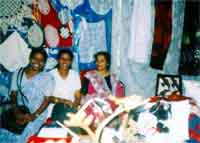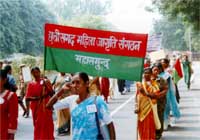This comment, made by one of the two Indian coordinating bodies (All India Democratic Women's Association [AIDWA]), confirmed Indian women's determination to take forceful action against the effects of globalization in their country.
In March 2000, AIDWA published a detailed document on the effects of market reform and adjustment programs on women, mostly those living in rural areas. The outcome of a seminar held in New Delhi, the report is called Women Speak, United Voices against Globalization, Poverty and Violence in India.
It describes the deterioration of food policy in the mid-1990s. As the population grew, average consumption of grain dropped in all states except Kerala and West Bengal. Support for public policy was also withdrawn and stores selling goods at subsidized prices became less well stocked, forcing women to buy food in the free market.
Opening the doors to foreign companies brought about a change in crop cultivation (aquaculture and horticulture took over from the traditional rice growing). Other crops were abandoned, with the attendant unemployment. The authors insisted on the extremely negative impact of the drop in prices for coconut and rubber in the state of Kerala.
Neoliberalism has also hit social programs: expenditure on public health establishments is declining, and basic supplies and equipment (water, electric power, sanitary facilities) are lacking.

Rural women are the first victims of all these policies. Their income is directly affected by the drop in prices of agricultural products and by the development of services geared mostly towards the cities.
To eliminate poverty, Indian women, including the other national coordinating body, the National Alliance of Women (NAWO), demanded fair practices in food production and distribution. They urged the Indian government to resist the policies and pressures coming from the forces of globalization; they insisted that it put an end to structural adjustment programs and the privatization of health services, education and infrastructure, and that it ensure the observance of labour standards in free trade zones.

Women also fight to preserve all forms of resources they possess. On March 8, 2001, they advocated the March objectives. These objectives continued to be relevant since in Delhi women "have been badly affected by recent Supreme Court judgements which do not permit them to earn their living through street vending…. Other related issues are the demolition of slums as well as closure of factories," a member of the AIDWA coordinating body explained.
For its part, NAWO continues its research into the effects of globalization on women's situation while lobbying political decision makers.







